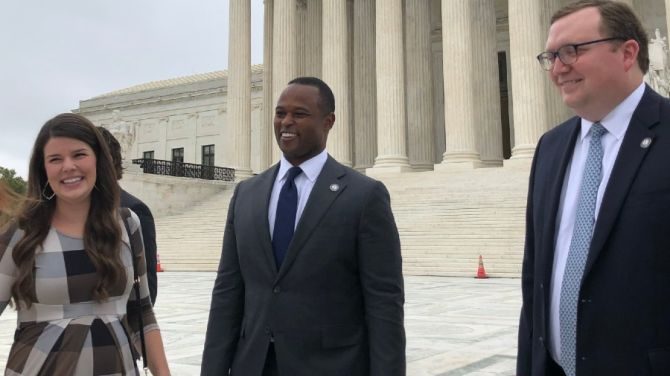The office of Kentucky’s attorney general appeared at the Supreme Court on Tuesday, asking to be allowed to intervene in defense of the state’s dismemberment abortion ban.
Kentucky’s pro-life law, H.B. 454, passed the state legislature in 2018 and was signed into law by then-governor Matt Bevin (R). It bans the practice of live dismemberment abortions, a second-trimester abortion procedure, after eleven weeks of pregnancy. The law was subsequently challenged by the state’s only abortion facility, and was overturned in a federal court.
While the current governor and health secretary do not support the law, Kentucky’s attorney general David Cameron (R) is seeking to intervene in defense of the law and to have it reconsidered at the U.S. Sixth Circuit Court of Appeals. When the Sixth Circuit would not allow Cameron to intervene in the case, the attorney general appealed to the Supreme Court.
After oral arguments concluded on Tuesday, Cameron said he was “excited” and “optimistic” about his case, calling it an “honor” to seek to defend the law.
“Basically, what it [the law] said in overwhelming bipartisan fashion, is in Kentucky, we want to make sure that we show the compassion in the heart of the men, women, and children of all 120 counties in saying that if this [dismemberment abortion] procedure is occurring – again, we don’t necessarily want it to occur but if it is to occur – you don’t want the baby to feel pain in the womb,” Cameron said.
Cameron noted that he and his wife are expecting a baby in January. “The issue is more important to us,” he said, “knowing that we’ve got a little one on the way.”
“This is an important issue for Sisters for Life, this is an important issue for Kentucky Right to Life. This is important, again, for the men, women, and children of all of our 120 counties.”
The court is considering not the constitutionality of the law itself, which was struck down by a federal district court, with the Sixth Circuit upholding that decision. Rather, the court is considering whether Cameron is lawfully allowed to intervene in the case. As Cameron had only moved to defend the law once the Sixth Circuit upheld the lower court's decision, the circuit court ruled he could not intervene in the case.
In his brief at the Supreme Court, Cameron argued that as attorney general he had the “final say” on whether to accept the lower court’s decision. On Tuesday, the state’s principal deputy solicitor general Matthew Kuhn argued that the office should be allowed to defend the law in court.
Cameron is seeking to intervene “so the commonwealth could exhaust all appeals in defense of its law,” Kuhn said. Cameron is not doing so in a personal capacity, but in his lawful capacity as state attorney general, Kuhn said.
“This court’s case law instructs that acting for a state is a distinct capacity, because everyone agrees that the attorney general did not participate in that capacity in district court, he is not jurisdictionally barred from doing so now,” Kuhn said.
Kuhn told reporters on Tuesday that the state had created a “failsafe” for situations when government officials would not defend state laws. According to Kuhn, state law allows the attorney general to intervene in court in such cases to uphold the law.
Pro-life groups advocated on Cameron’s behalf on Tuesday.
“As chief enforcer of the Commonwealth’s laws, Attorney General Cameron should have the power to defend the will of the people to protect the unborn, stated Marjorie Dannenfelser, president of the Susan B. Anthony List.
“The legislature of Kentucky, elected by the people of Kentucky, passed the law to prevent the horrific deaths of unborn babies by dismemberment abortions,” stated Carol Tobias, president of National Right to Life.

